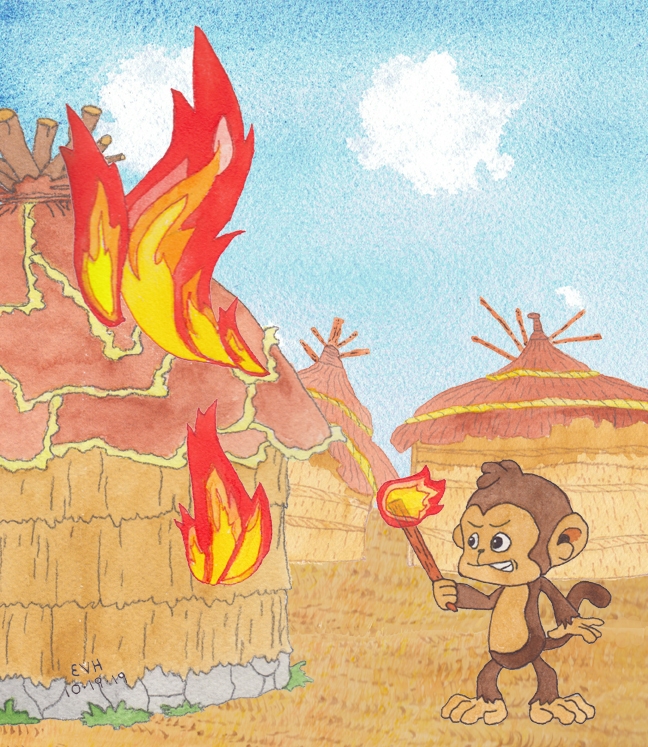
Jataka 177
Tiṇḍuka Jātaka
The (Black and White) Ebony Tree
as told by Eric Van Horn
originally translated by William Henry Denham Rouse, Cambridge University
originally edited by Professor Edward Byles Cowell, Cambridge University
Finally! A story in which a monkey is the hero! Yay!
“All around us see them stand.” The Master told this is a story while he was at Jetavana. It is about perfect knowledge. Just as in the Mahābodhi Birth (Jātaka 528), and the Ummagga Birth (Jātaka 546), when he heard his own wisdom praised, he remarked, “Not only now is the Buddha wise, but he was wise and resourceful in the past as well,” and he told this story from the past.
Once upon a time, when Brahmadatta was the King in Benares, the Bodhisatta was born as a monkey. He lived with a community of 80,000 monkeys in the Himalaya. Not far from where they lived there was a village which was sometimes inhabited and sometimes empty. And in the midst of this village was a tiṇḍuka tree (a “Diospyros Embryopteris,” or “black and white ebony” tree). It had sweet fruit, and it was covered with twigs and branches. When the village was empty, all the monkeys used to go there and eat the fruit.
Once when the tree was full of fruit, the village was full of people. The village was surrounded by a bamboo palisade, and the gates were guarded. The tiṇḍuka tree stood with its boughs bending beneath the weight of the fruit. The monkeys began to wonder, “There’s a village where we used to get fruit to eat. I wonder if that tree has fruit on it or no, and are there people in the village or not?”
They decided to send a scout monkey to spy. He found that there was fruit on the tree, and that the village was crammed with people. When the monkeys heard that there was fruit on the tree, they were determined to get that sweet fruit to eat. Working up their courage, a crowd of them went and told their chief. The chief asked whether the village was full or empty?
“Full,” they said.
“Then you must not go,” he said, “because men are very deceitful.”
“But, sire,” they said, “we’ll go at midnight when everybody is fast asleep, and then we will eat!”
So this great company obtained permission from great their chief. They went down from the mountains and waited nearby until the people went to bed. In the middle watch of the night, they climbed the tree and began to eat the fruit.
A man got up in the night for some purpose. He went out into the village, and there he saw the monkeys. At once he sounded the alarm. The people ran out armed with bows and arrows or holding any sort of weapon that came to hand. They surrounded the tree. “When dawn comes,” they thought, “we will have them!”
The 80,000 monkeys saw these people, and were scared to death. They thought, “There is no one who can help us except for our chief.” So they went to him and recited the first stanza:
“All around us see them stand, warriors armed with bow and quiver,
All around us, sword in hand, who is there who can deliver?”
At this the monkey chief answered, “Fear not. Human beings have plenty to do. It is the middle watch now. There they stand, thinking, ‘We'll kill them!’ But we will find some way to hinder this business of theirs.” And to console the monkeys he repeated the second stanza:
“Men have many things to do. Something will disperse the meeting.
See what still remains for you. Eat, while fruit is left for eating.”
The Great Being comforted the monkey troop. If they had not had this crumb of comfort their hearts would have broken and they would have perished. When the Great Being had consoled the monkeys, he cried, “Assemble all the monkeys together!” But in assembling them, there was one they could not find. It was his nephew, a monkey named “Senaka.” So they told him that Senaka was not with the group. “If Senaka is not here,” he said, “have no fear. He will find a way to help you.”
Now when the monkey troop had gathered together, Senaka had been asleep. Later he woke up, and he did not see anyone near him. So he followed their tracks, and by and bye he saw all the people down below. “There is some danger for our troop,” he thought. Just then he saw - in a hut on the outskirts of the village - an old woman. She was fast asleep in front of a fire. Pretending that he was a village child going out to the fields, Senaka seized a burning piece of wood. And standing well to the windward side, he set fire to the village. Then the men all left the monkeys, and fled back to put out the fire. So the monkeys scampered away, and each one of them brought a fruit for Senaka.

Figure: Senaka Saves the Day!
When the Master had finished this discourse, he identified the birth: “Mahānāma Sakka was the nephew ‘Senaka’ of those days. The Buddha’s followers were the monkey troop, and I was their chief.” (Mahānāma Sakka was a cousin of the Buddha’s. There is a discourse in the Aṇguttara Nikāya called “The Mahānāma Sakka Sutta” [AN 3.73]. It was told to Mahānāma Sakka by Ānanda.)
